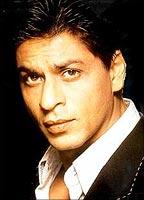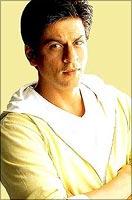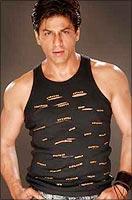There's no denying that Shah Rukh Khan is truly the King of Bollywood. But it's surprising that even though we know so much about this star, there is a lot more we don't know.
For example, did you know that SRK's father wanted to become an actor, and tried to get a part in Mughal-e-Azam?
Or that, he has a cousin in Peshawar, who lives in a mud house?
Or even that he spent long hours crying in his office when his first home production Phir Bhi Dil Hai Hindustani did not do well?
Anupama Chopra seems to have discovered the man behind the star in her new book, King Of Bollywood, priced at Rs 395. The author, whose first book Sholay: The Making Of A Classic won a National Award, tells Syed Firdaus Ashraf and Ronjita Kulkarni why she chose to write on SRK.
Why did you decide to write a book on Shah Rukh Khan?
This book grew out from an earlier book I had done, on the making of Dilwale Dulhaniya Le Jayenge, for the British Film Institute. While doing that, I became very interested in Shah Rukh's dramatic rise to superstardom. This is the story of a guy who comes from nowhere in post-liberalised India.
 Since you mention liberalised India, in the 1970s we were a country of shortages. There were lack of opportunities for people and in that, emerged a man called Amitabh Bachchan, who was anti-system and became a hero. Do you think India's changing economic scenario in the liberalisation era helped Shah Rukh become what he is today?
Since you mention liberalised India, in the 1970s we were a country of shortages. There were lack of opportunities for people and in that, emerged a man called Amitabh Bachchan, who was anti-system and became a hero. Do you think India's changing economic scenario in the liberalisation era helped Shah Rukh become what he is today?
Absolutely! In the book, I talk about how he is the face and catalyst of a new consumerist society. You know nobody did advertisements like Shah Rukh Khan did. He is really the face of new consumerist urban India which is the link the book is trying to make.
Shah Rukh's rise came at a time when the Hindutva movement in India was at its peak. There was the demolition of the Babri Masjid in 1992 followed by the Mumbai riots. Political circumstances did not seem to matter to his rise. Why do you think so?
But these things have never mattered in Bollywood. The film industry has never worked according to the religious communities. Within the industry, people only worship the box-office (laughs). It is a very secular place and I have never heard otherwise on grounds of religion -- not at the level of stars nor at the level of spot boys.
In the earlier days, Yusufsaab had to change his name to Dilip Kumar because he wanted to be perceived as a Hindu. Of course, it was a fraught climate then (the time of Partition).
But why a book on Shah Rukh and not Sanjay Dutt, who has acted in your husband Vidhu Vinod Chopra's films - Mission Kashmir and the Munnabhai series?
It is not about who is close to my husband. Shah Rukh is the face of India in the new millennium. Sanjay Dutt, of course, would be a very different book from this.
How did you structure the book?
It was a big struggle because I wanted it for all the audiences. I wanted it for mainstream American audiences, Indian fans of Shah Rukh, German fans of Shah Rukh... I had to write for people who know everything about Shah Rukh and at the same time, for people who know nothing about him. It was very tricky.
From the time I spoke to Shah Rukh, it has been four years. It took me a year to find an agent in America. The writing and researching took three years.
 How many hours did you spend with Shah Rukh?
How many hours did you spend with Shah Rukh?
I had about 30 hours of conversation (with him). But besides that, I followed him to Jaipur when he was shooting for Paheli. I would send SMSs and e-mails. He is very happy when the book was over (laughs).
What was his first reaction when you said you want to write a book on him?
He asked me why. He didn't say yes. He wasn't convinced the book needed to be done. He was embarrassed to know that somebody would take four years to write a book on him.
But I was very persistent and felt his life is a great story to be told. Once he said yes, he was very supportive.
The book has lots of things about his parents. Why did you go there?
Because it is important to know where he came from. I was fascinated that he came from an area of Peshawar, where Raj Kapoor's and Dilip Kumar's family came from as well. This is one locality that has given us some of the biggest names in Hindi cinema.
It is also incredible that his father (Meer Taj Mohammad) had come to Mumbai to become an actor. He tried to get a role in Mughal-e-Azam in the 1950s and wanted to meet Ashok Kumar. Anil Kapoor's father Surinder Kapoor was one of the assistants on Mughal-e-Azam, and he knew Meer well.
But Meer was a proud man and the film industry is a brutal business. You are treated very badly until you become someone. He spent a year trying to become an actor. But he could not, so he went back to Delhi and did a series of businesses. He tried his hand at a restaurant business, furniture business, lorry business... But none of them were successful.
It is ironical that his son made it big but Meer was not alive to see it. He died when Shah Rukh was 15 years old.
I find his mother very fascinating too; the way she raised her children when her husband died.
Did you speak to Shah Rukh's sister?
Shahnaz Lala Rukh Khan? No, I didn't.
 Very little is known about Shah Rukh's immediate family. Did you speak to anyone?
Very little is known about Shah Rukh's immediate family. Did you speak to anyone?
I spoke to his cousin, Mansoor Ahmed Khan, in Peshawar. He lives in a mud house and I interviewed him over the phone. I wanted to go to Peshawar but my husband put his foot down there (laughs).
How many people did you speak to?
About 80 people. I spoke across the board to his friends and school teachers. I also spoke to (director) Harry Baweja, who was going to make a film on him, Karan Johar Aditya Chopra, his friend Kajal Anand, the lawyer.
Did you have any obstacles while writing this book?
The real challenge was tracking down Bhavesh, whom I begin the book with. He is a big fan of Shah Rukh and lives in a small town in Georgia called Dalton. I saw him in Nasreen Munni Kabir's The OuterWorld of Shah Rukh Khan.
Leo Mirani, my research associate, and I went mad trying to search for this guy. I finally found him in Ahmedabad, when he was visiting his family.
It was Operation Bhavesh (laughs)! He came to Mumbai while catching a flight back, and I interviewed him while he was travelling by road from the Mumbai domestic airport to the international airport.
Most biographers are so overawed by their subjects that they don't highlight the negative aspects. Have you lost objectivity on SRK? Or did you keep a distance from him?
I had been impressed with him, that's why I wrote a book on him. But yes, one has to keep a distance from your subject and not enamoured by him. You need to be objective. My line of questioning was never to find a scandal.
So your book does not highlight the controversies in Shah Rukh's life?
(laughs) I didn't go looking for controversy.
So Shah Rukh has no controversies?
The biggest controversy or rumour is that he is bisexual and is having an affair with Karan Johar. He laughs about it.
Shah Rukh is writing his own memoir as well.
Yes, he is writing; it is in first person. He has shown me a bit on his computer.
Tell us something about SRK that the world does not know yet.
Shah Rukh's first role was in a film called In Which Annie Gives It Those Ones in 1988. It was directed by Pradeep Krishan and written by Arundhati Roy.
He wanted a big role but he was too much of a star even at that time. So he played an extra called 'Senior'.
Shah Rukh also told me how difficult it was for him when Phir Bhi Dil Hai Hindustani bombed. At that time, the rise of Hrithik Roshan had begun with Kaho Na... Pyaar Hai. Shah Rukh talked about how shattered he was when his film flopped and Hrithik became a superstar. You know, successful people tend not to revisit failure. For him to talk about how he, Juhi Chawla and Aziz Mirza used to sit in office and cry...
He spoke about how difficult it was for him to get out of house without having a mike thrust in front of him, asking him what he thought of Hrithik. He said that he felt terrible as people wrote off 10 years of work.
You also have a chapter on Shah Rukh and the underworld.
Yes. But I would rather not go there.
What is your favourite chapter?
I loved writing about his parents. His father sounds very fascinating. I loved his childhood and his involvement in theatre. He also spoke very movingly about the death of his parents.
Has Shah Rukh read the book?
He has read large chunks of it as I was writing. He has never asked me to change anything, not even a comma.
How will your book be different from the other books on Shah Rukh?
It is different because it is a book not on Shah Rukh but on Bollywood and India through life and times of Shah Rukh.
So what drives Shah Rukh Khan?
It is fear. His energy is unflagging; he's an insomniac. I have interviewed him at 2 am and he is completely awake and I said, 'Okay, I think I need to go to bed now (laughs).' He seems to need no sleep at all.
I first met him on the sets of Yes Boss. He had the energy and that has not changed in any way.
Which star would you like to write on next?
Aditya Chopra, but he has gone completely silent on that. I once asked him through SMS but there was no reply from his side (laughs). He does not talk easily and it was with great difficulty that I made him speak to me on Shah Rukh Khan. He is one of the chief architects on this Shah Rukh Khan persona. Thankfully, he agreed.






 © 2025
© 2025